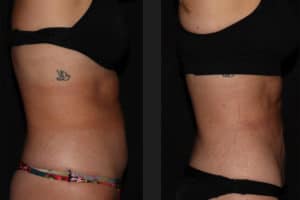Am I a Good Candidate for Liposuction?
Liposuction is a very powerful procedure capable of providing dramatic results, but to see these amazing results you need to be someone who is an appropriate candidate for the procedure.
- First, will liposuction help me lose weight?
- Is liposuction good for obesity?
The answer to this is no. Liposuction is a shape change procedure not a weight change procedure.
Liposuction will improve the contour and the curves of your body, but it will not take someone who is generally large and make them smaller.
If you have defined fatty deposits that aren’t responding to diet and exercise and very hard work in the gym, then liposuction is a potentially good solution.
On the other hand, if you’re looking at liposuction as a way to go from being someone who is far from their goal weight to someone who’s very skinny, or if you’re looking at liposuction as a potential cure for obesity, liposuction is not the right procedure.
The reason for this comes back to the way that fat metabolism or fat biology works.
Once we reach adult maturity we have a relatively set number of fat cells or adipocytes in our body. When we gain weight our fat cells become larger because we store more lipids in them and when we lose weight our fat cells become smaller because our body uses those lipids as fuel.
We do not however generally create fat cells when we gain weight, and we don’t destroy fat cells when we lose weight.
When you have a liposuction procedure and surgeons permanently remove a certain number of fat cells, your body still needs to store fat and lipids elsewhere.
That means that the remaining fat cells in your body will have proportionately more fat and lipid stored in them to compensate for the loss of fat besides elsewhere in the body.
If they remove a certain amount of fat by liposuction your overall weight probably won’t change that much.
For example, if they have performed liposuction of your abdomen it’s not like all of a sudden your left arm is going to get larger. In general, the body does a fairly good job of evenly redistributing that volume throughout the body.
If you’re looking to improve the shape of your body and to address fatty deposits liposuction can be a great option.
If on the other hand, you’re looking to lose weight or to cure obesity, liposuction is not the right solution for you. In those cases, surgeons tend to refer patients to medical and surgical weight loss specialists.
Medical weight loss specialists use a combination of medication and lifestyle changes to achieve weight loss and or surgical weight loss doctors are performing bariatric surgery procedures like gastric bypass procedures to help patients lose weight.
Liposuction will help you see changes in the mirror but not on the scale.
Another question people ask commonly is:
Is liposuction a good option to get rid of my beer belly?
This is particularly frequent in men, who can accumulate a lot of fatty deposits in the abdomen which can be extremely stubborn, recalcitrant to diet and exercise.
This is a fairly easy question for people to answer at home.
If you can look at your abdomen and you have a bit of extra fat there that you’d like to get rid of, if you can pinch that fat, that’s fat that surgeons can effectively address with liposuction. Any fat that you’re not able to grab and pinch, that they really can’t access with liposuction.
This comes down to the anatomical distinction between what’s called superficial fat and deep fat.
Superficial fat is the fact that we find right under the skin it’s also sometimes called subcutaneous fat. This is the fact that they can very effectively treat with liposuction.
However, the other kind of fat which they can’t grab or pinch as effectively is called deep-fat or visceral fat.
Visceral fat or deep fat is the fact that they find under the abdominal wall.
The abdominal wall is composed of muscles and perhaps the most well-known of those muscles are the rectus abdominis muscles or the 6 pack muscles and underneath the rectus muscles, underneath the 6 pack muscles are your vital organs like your intestines, your liver, or spleen, or pancreas, and all of those organs have fat around them.
That fat around your organs and intestines is called deep-fat or visceral fat.
That’s fat that surgeons really can’t safely access with liposuction or any surgical procedure. That deep fat, that visceral fat can only effectively be eliminated or reduced to diet and exercise.
If you’re able to grab or pinch your belly, that fat that you’re able to hold on to, surgeons can’t get to with liposuction because it’s probably over your abdominal wall.
If you’re grabbing your belly and not getting that much but you still have a fair amount of both which is hidden under your abdominal wall, they really can address that effectively with liposuction.
There are also a lot of patients that come in asking about liposuction, who want to know if they’re a good candidate for liposuction even if they have a lot of loose skin.
To answer this question we have to understand that liposuction is a fat reduction procedure, not a skin reduction procedure.
When surgeons remove extra fat out of the body with liposuction, they are relying on the skin to contract to wrap itself around the new shape that they achieved, and in the amount of skin contraction that they can expect really depends on several factors like patient age and patient health, and also environmental factors like smoking.
For example, a young healthy 20-year-old nonsmoker is going to have much better skin elasticity than a much older person who’s been smoking all their life, so in that younger healthy patient if they suction a reasonable amount of fat from a given area of the skin is going to contract and shrink-wrap itself to the new body shape very nicely in most cases.
However, in the older individual who doesn’t have that same degree of skin elasticity who has very lax skin, that skin probably won’t shrink-wrap itself to the nice form that they’ve created with liposuction.
This is where the importance of a consultation with a body contouring expert or a board-certified plastic surgeon becomes key because they’re going to help you find out where you fall on that spectrum between the young healthy person whose skin is going to contract and the older less healthy person who might not have as good skin elasticity and help you decide if you need other procedures in addition to liposuction to help you get the result that you’re going to want to achieve.
The kinds of procedures we’re talking about here to help with skin contraction, to help deal with extra skin, are in people with mild to moderate skin excess.
Things like radio frequency, skin tightening with the BodyTite system, and in people with more severe skin laxity they are looking at actual skin excision procedures, things like abdominoplasty, tummy tuck in the belly or Brachioplasty or arm lift for the arms, I thigh lift in the legs, or a neck lift or facelift for the face and neck.
Another common question is:
Will liposuction help me treat my cellulite?
This is a question that doesn’t have a clear answer.
Increasing or decreasing fatty volume does not have a predictable effect on the appearance of cellulite.
If surgeons perform liposuction often combining it with BodyTite radiofrequency skin tightening and especially if they also perform some fat grafting to fill in skin depressions, they can achieve a net improvement in the appearance of skin in the treatment area.
Hopefully, this review has helped you to determine if liposuction might be a good procedure for you. We encourage you to have a consultation with a board-certified plastic surgeon, specializing in body contouring to help you decide on the best procedures to help you achieve your aesthetic goals.





